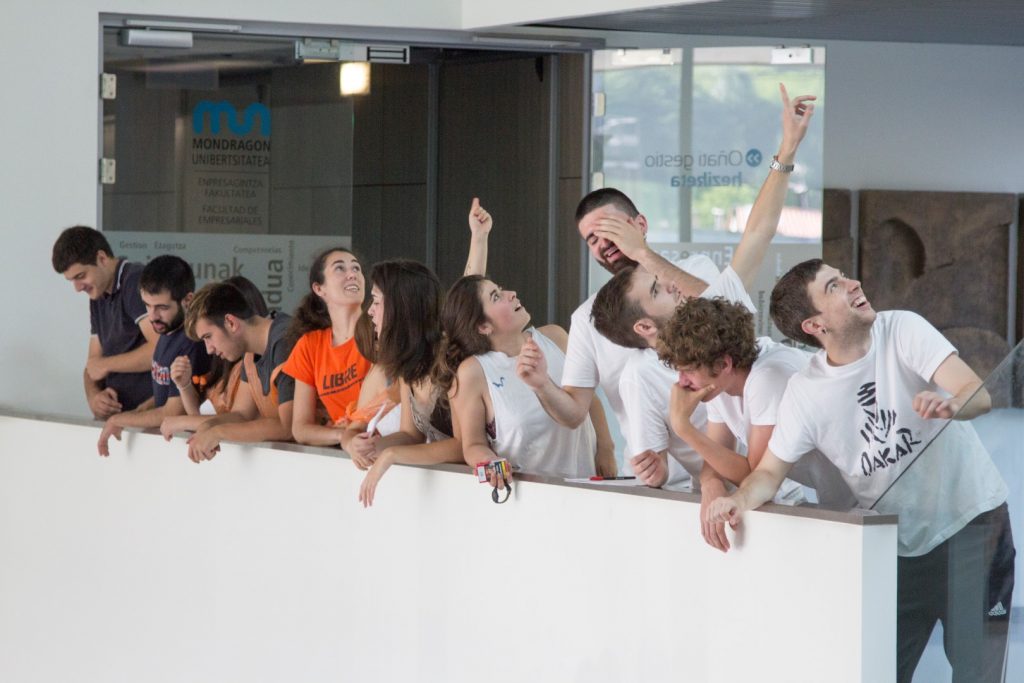Authors: Josune Prieto & Annamari Tormanen, MUE (ES)
One of the cases which was investigated in the Higher Education Offer Review within the Stage Of the Art analysis of beFORE project comes from Spain, Entrepreneurial Leadership and Innovation (LEINN) undergraduate programme carried out by Mondragon Team Academy (MTA), the Entrepreneurship Unit within the Faculty of Business Studies of the Mondragon University. This programme stands for entrepreneurship education following the finnish Tiimiakatemia learning by doing method in which the students are not taught about entrepreneurship, but are given the tools to set up their own ventures.
The main cornerstone of the methodology is team learning, where the students become teampreneurs (team entrepreneurs) and protagonist of their own learning process. They commit to create real companies throughout the 4-year academic process and take responsability for their participation, complementing other members’ abilities and personal skills. The key to MTA lies in connecting the teampreneurs’ passions with their learning process, and doing so as a team, rather than individually, in which you only succeed if your team mate succeeds as well.
The MTA Unit is also leading the creation of a global network of local MTA centers, or “labs”, in which the teampreneurship concept is replicated and adapted. This ensures a connection between the local communities and the global learning process, providing a source of inspiration for initiatives and solutions. Next year, in April 2018, will celebrate the 10th anniversary since MTA was created and started running LEINN. Nowadays, besides the three labs located in the Basque Country, MTA is also in Madrid, Barcelona, Valencia, Mexico, India and Shanghái. To date, 9 international labs have been established with the goal of reaching 20 labs by 2020.
Throughout the degree’s four years, the students are encouraged to “un-learn” everything they know and are taught to become team players. From day one the students create a “team learning cooperative” (legally presented as an association) based on their interests and personal abilities, and year by year they even give more professional status to their company, while the fourth year is dedicated at scaling and expanding the business’s outreach.

Throughout the 4-year process, the students (or “LEINNers”) go on Learning Journeys, with expenses covered by the revenues generated from their own companies. The trips include Finland, to understand the roots and experiment the innovative education system, San Francisco (Silicon Valley), to discover the cradle of entrepreneurship; India, to connect with a radically different social, cultural and economical context and social entrepreneurship; and finally China, in which they are encouraged to scale up their business projects addressing one of the biggest emerging economy and find new potential business partners. As well as providing a global experience far different from their own environment, these journeys have a strong social component, ensuring that the students are aware of the intrinsic social nature that all enterprises must include.
In order to accelerate the current social transformation process, beyond creating the “generation of the future”, MTA launched other programmes testing its vision and methodology within other target groups such as:
- MINN (a one-year Master Programme in Intrapreneurship and Open Innovation), with the same principles and methodologies as LEINN, but aimed at professional leaders, intrapreneurs, business-owners, or start up entrepreneurs.
- EKINN (Entrepreneurship Knowledge and Innovation) is a 12-month pilot project aimed at the unemployed, in which 75 people participated. Since then, 15 of them founded their own company.
Figures show that one year after graduation, 35% of LEINN alumni are taking on entrepreneurial activities (compared to 1 – 2% of students from regular university degrees), 47% are working on intrapreneurial or innovation related projects within existing organizations and 97% are employed.
In this sense, as it is shown in the article this Higher Education Programme can be considered as one of the best cases in terms of promoting proactive attitudes and futures thinking skills among university students. It is also an evidence that we ensure the awareness of the ability they have to influence the future even in the constantly face of uncertainty and change that we are living and we are gonna live.
“The world has not been given to us simply to contemplate it, but to transform it” (Father José María Arizmendiarrieta, founder of the Mondragon cooperative Movement”.
